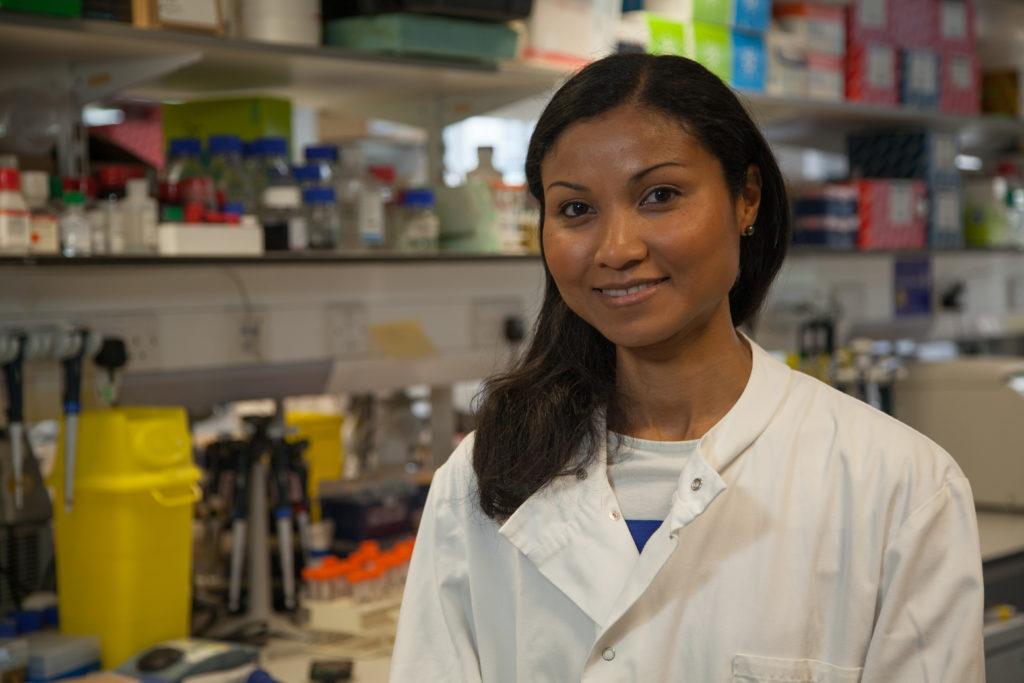Lymphomas: Perspectives from bench and bedside
Q&A with Dr Okosun
To mark the end of Blood Cancer Awareness Month in September, we spoke to Dr Jessica Okosun, a Group Leader in Barts Cancer Institute’s Centre for Haemato-Oncology. Dr Okosun is a clinical researcher whose work is centred around understanding the mechanisms involved in the initiation and progression of a group of blood cancers known as B-cell non-Hodgkin’s lymphomas.
What motivated you to focus on blood cancer as a clinical researcher?
I was first drawn to haematology very early in my clinical training, when I looked after patients with blood cancers. The things that struck me were the acuity by which patients became ill when they are diagnosed, and the pace at which patients can recover with effective treatments. Remembering the patients, the ones we helped but especially the patients that we could not help is really an abiding reason and a real driving force for why I wanted to specialise in haematology and also be involved in research.
Why lymphoma in particular?
Lymphoma is fascinating to me because it is the 5th or 6th most common cancer worldwide, though many may not be aware of this. There are about 60 different types of lymphoma, all with different clinical behaviours - they can be fast growing, slow growing, curative and not curative. This tells us that the different types need different treatment strategies, and underpins that the biology of each of these types of lymphoma is very different.
What is your research focusing on at the moment?
We are trying to understand different subtypes of lymphoma, particular those that are derived from B cells (B cell lymphomas). We use a reverse translation approach in our research - we study patients’ tumour samples and try to determine how the cancer started in the first place, why cancer of the same subtype behaves differently in different patients (heterogeneity), and whether this diversity in the cancer behaviour explains why some patients respond to some therapies and why others don’t.
In many patients, standard therapy can fail as their cancer progresses. We are trying to understand how the tumours change over time in the hope of finding better ways to predict cancer behaviour and identify more effective strategies for treating patients as their cancer evolves.
Do you think your role as a clinician affects how you conduct your research and vice versa?
As a clinician and a researcher, I guess I am a natural conduit between the patients and the laboratory. As a clinician, you are able to identify what the unanswered questions are in the clinic, which we can then carry forward to the laboratory and attempt to answer. You also see the effect of the transformative research that has made its way from bench to bedside and how this can help patients. At the same time, when in the laboratory, I see how long it takes to get an idea from the bench to bedside, and where the bottlenecks in research exist.
What do you think are the biggest challenges facing lymphoma treatment at the moment?
I think we are in a privileged position at the moment – we have an increasing library of lymphoma drugs, at least for certain subtypes of lymphoma; however, the challenge that we have is working out which drug will benefit which patient. Another challenge is that there are still subsets of patients who are underserved by our standard-of-care treatment. They include patients who have failed the standard therapies, as they have limited other options, as well as those with rarer subsets of lymphoma that have not been studied very well. We may need to start thinking about strategies to prioritise these patients.
What do you anticipate will change in the next 5 years in terms of lymphoma treatment?
There has been a huge explosion in the new generation of immunotherapies, such as CAR T cell therapy. These kinds of treatments could potentially be curative in some patients with lymphoma.
Unfortunately, a lot of lymphomas remain incurable - most patients would have lived for a long period with their lymphoma and received a variety of different treatments. Therefore, I think the emphasis going forward should be on reducing the toxicity of treatments in patients. This may be through using less chemotherapy or using agents with better side-effect profiles.
Lastly, I think what we’ve lacked for a long period of time is being able to marry the biology of disease with how we select treatments for patients. Now that we have a better understanding of the underlying biology of most lymphomas we hope we will be able to use this information to inform how we select patients for treatment.
To find out more about Dr Okosun’s research, please click here.
Category: General News, Interviews


No comments yet